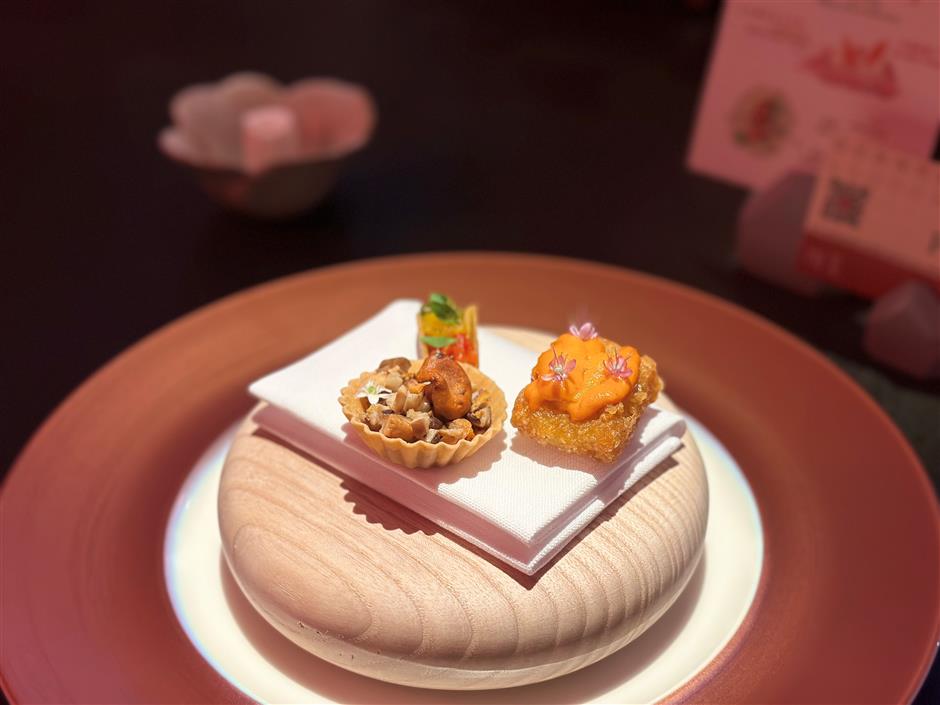Experience the best of Ningbo's cuisine at Pan Pacific Ningbo's anniversary dinner party

Pan Pacific Hotel and Serviced Suites Ningbo presents a unique dinner party to celebrate its 11th anniversary.
Without leaving your hotel, you can experience the unique culture of Ningbo. The Pan Pacific Hotel and Serviced Suites Ningbo hosted a dinner party to celebrate its 11th anniversary. Locally sourced ingredients and traditional Ningbo dishes were served, telling the stories of the city.
The hotel lounge, Pacific Club, has been transformed into Viva Magenta, Pantone's color of the year. With black-and-white floors and flowing curtains, the stage immerses you in the drama of theater. On-site henna brings a mystic charm to the evening, all over a nice drink. The theme of the dinner is MEET 11.

The lounge is transformed in Viva Magenta – Pantone's color of the year.
Charles Luo, the general manager of the hotel and a designer for the event, has put together an amazing menu that has allowed guests to experience the best of Ningbo cuisine.
For him, it's the city's unique take on tangyuan, made from rice as opposed to the more standard glutinous rice, with smaller seafood providing a meatier texture. Fusing local ingredients with French culinary techniques also brings Ningbo cuisine a unique flavor.
Begin your meal with three delicious amuse bouche: chanterelle tarts, eggplant and basil tacos, and bonito dashi pumpkin rice cake with sea urchin. Cifangao, a fried rice cake, makes up a traditional Ningbo breakfast. The tender sea urchin and chewy rice create a contrasting texture, reinventing the local snack.

The menu

Begin your meal with three delicious amuse bouche: chanterelle tarts, eggplant and basil tacos, and bonito dashi pumpkin rice cake with sea urchin.
Guests can expect an extraordinary culinary experience with the perfect blend of traditional flavors and innovative techniques. The combination of Shunde and Ningbo cuisine promises to be a delightful treat for the taste buds. The Baihua lychee's unique twist and the 15-day crispy marinated duck's cooking techniques are just some of the highlights of the menu. The attention to detail and the use of fresh local ingredients make this menu an unforgettable dining experience.

The 15-day, crispy marinated duck

Ginger flower papaya chicken soup, served with yellow croaker and fish maw dumpling.
The papaya chicken soup is another specialty of the menu. It is served with yellow croaker and fish maw dumplings and has ginger flower as a fresh garnish. Yellow croaker is a renowned Ningbo dish, but in this case, it finds a new flavor in dumplings, stepping away from the traditionally steamed presentation.
To wind down after a delicious meal, caviar and wild moral biscuit on walnut ice cream are the perfect complement to the stunning views of mountains and water.
Ningbo food features its own original flavor, one that Luo believes should remain simple and clean, even with a change in the method of cooking.
"In each dish, everything is edible, including sauces, garnishes, etc. We've removed the more complicated decorations of the French, and there isn't too much flavor fusion in one dish."

Eleven kinds of creative desserts are displayed at the dinner party.
Today, hotel restaurants are playing a more vital role than ever before. They are no longer just places for guests to eat, but also a place to enjoy the unique flavors of the city.
According to Luo, hotel catering has become a significant source of income for the hospitality industry in China. Many hotel restaurants have received Black Pearl Restaurant awards from Dianping, attracting not only hotel guests but also local guests.
"Food safety, dining environment, and quality flavor are always ensured at a hotel," Luo added.
Q&A

Charles Luo, general manager of Pan Pacific Hotel and Serviced Suites Ningbo
Q: Whenever a city is mentioned, people's first reaction is often related to its cuisine. In your opinion, what dish best represents Ningbo?
I grew up in Shanghai, and about 11 years ago I came to Ningbo for the first time to work at Pan Pacific Hotel. I still remember, if there were Ningbo people living in the Shanghai lanes, their homes would always have a variety of preserved goods. In my opinion, the dishes that best represent Ningbo are these preserved items. The most famous is qiangxie (preserved crab). The recipe is very simple, just saltwater and crab, nothing else. The crab is frozen. When you eat it, it melts in your mouth like ice cream.
Ningbo isn't actually a tourist city, it's an industrial city, so there isn't much promotion of its cuisine. But for me, Ningbo's preserved seafood, such as huangniluo (salted mud snail), has more flavor compared to Chaozhou in Guangdong Province. The seafood in Ningbo is different in terms of freshness, and it can be paired with anything, wine or rice, creating a balanced taste experience.
Q: How would you describe the relationship between F&B and lodging in hotels?
Many hotel groups, including ours, are gradually starting to recognize the importance of restaurants. Today, the monthly revenue of a Chinese restaurant in many hotels exceeds that of the guest rooms. For example, in our hotel, nearly half of our 400 employees work in the food and beverage department. The chefs in hotels have a higher status, and the restaurant can also become a highlight of a hotel. For today's guests, their consumption habits are changing. Food safety and taste are equally important, so hotel restaurants are becoming more attractive to guests.
Q: Can we see the hotel's operating philosophy at the 11th anniversary dinner party?
Our operational philosophy is centered around people. We hope that every guest who comes to Pan Pacific Ningbo can feel our sincerity. Just like the dishes, flavors, and presentation at the dinner party, which is clean, simple, and generous, always considering the needs of the guests.















